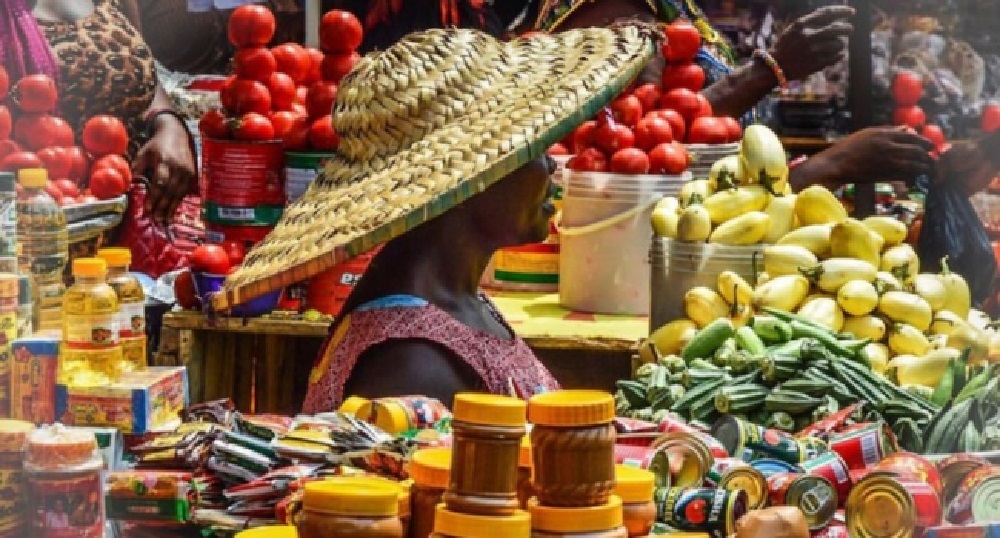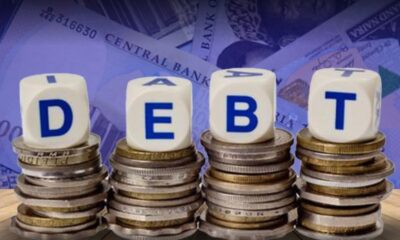Economy
Tariff hike: Telcos, ICT firms owe banks N1.69tn

Information, communication, and technology firms, including telecommunications companies in Nigeria, owed Deposit Money Banks N1.69tn as of September 2024 amid telcos’ calls for a hike in the tariff payable by subscribers for data and voice calls.
Figures obtained from the Central Bank of Nigeria’s quarterly statistical bulletin indicate that the indebtedness of the telcos and the other ICT firms represents a year-on-year decrease of N68.04bn, or 3.9 per cent, compared to the N1.77tn owed in September 2023.
The decline reflects the impact of the CBN’s repeated interest rate hikes, which has tightened monetary conditions and discouraged borrowing within the sector.
Month-on-month, however, there was a slight increase of N31.61bn, or 1.9 per cent, from the N1.66tn recorded in August 2024.
The year-on-year analysis shows that credit to the ICT sector experienced mixed trends throughout 2024.
In January, credit stood at N2.47tn, marking a significant increase of N1.23tn, or 99.3 per cent, compared to N1.24tn in January 2023.
However, by February, credit had declined to N2.35tn, though it still represented an 88.4 per cent increase year-on-year, with a difference of N1.10tn compared to February 2023.
By March, the pace of borrowing slowed further, with credit falling to N1.67tn. This represented a year-on-year increase of N385.24bn, or 30 per cent, compared to March 2023.
The trend continued into April, where credit remained relatively stable at N1.66tn, up N241.90bn, or 17 per cent, year-on-year.
In May, credit rose slightly to N1.68tn, reflecting an N308.38bn, or 22.4 per cent, an increase compared to the same period in 2023.
From June, year-on-year figures began to show a decline. Credit to the sector dropped to N1.64tn in June, representing a decrease of N81.59bn, or 4.7 per cent, compared to June 2023.
July saw a further decline to N1.69tn, down N48.93bn, or 2.8 per cent, from July 2023.
In August, the decline deepened, with credit falling to N1.67tn, a reduction of N107.37bn, or six per cent, compared to the N1.77tn recorded in August 2023.
By September, the year-on-year decrease of N68.04bn drew attention to the cautious borrowing stance adopted by firms in response to persistent economic uncertainties and high interest rates.
The decline in credit to the ICT sector throughout 2024 can be attributed to the CBN’s tight monetary policies, which have raised the cost of borrowing.
The apex bank has consistently hiked interest rates in a bid to curb inflation, with its monetary policy rate standing at a record high for most of the year.
CBN Governor Yemi Cardoso, who assumed office in September 2023, has overseen six interest rate hikes in 2024.
In February, the Monetary Policy Rate increased by 400 basis points, moving from 18.75 per cent to 22.75 per cent, the largest single hike of the year.
This was followed by another increase in March to 24.75 per cent. In May, the rate was raised again to 26.25 per cent, and by July, it reached 26.75 per cent.
The tightening cycle continued with an increase to 27.25 per cent in September, and the most recent hike in November brought the rate to 27.50 per cent.
These cumulative increases, totalling 875 basis points, are part of efforts to combat inflation and stabilise the economy.
This has had a direct impact on the borrowing capacity of firms, particularly those in capital-intensive sectors such as ICT.
Also, macroeconomic challenges, including exchange rate volatility and rising operational costs, have further constrained borrowing activity.
Despite these challenges, the ICT sector remains a critical driver of Nigeria’s economy, contributing significantly to Gross Domestic Product growth and employment.
Activities in the ICT sector contributed 16.35 per cent to Nigeria’s real GDP in Q3 2024, a decline from the 19.78 per cent it added in the previous quarter.
The National Bureau of Statistics disclosed this in the Q3 2024 GDP report.
The contribution was, however, higher than the 15.97 per cent contributed by the sector in the same period of last year.
According to the NBS, the ICT sector comprises the four activities of Telecommunications and Information Services: Publishing, Motion Picture, Sound Recording, and Music Production, as well as Broadcasting.
In the third quarter of 2024, the sector recorded a growth rate of 5.92 per cent in real terms, year-on-year.
This was driven largely by activities in the telecommunications sub-sector, which contributed 13.94 per cent to the GDP in the real term.
According to NBS, the telecom industry was the third-largest contributor to the real GDP in Q3 2024, coming behind only crop production and trade industries, contributing 26.51 per cent and 14.78 per cent, respectively.
The telecom industry, which is dominated by mobile network operators including MTN, Globacom, Airtel, 9mobile, and Internet Service Providers, is also driving a lot of activities in every other sector of the economy.
The closest sub-sector to telecoms in the ICT sector in terms of contribution was Broadcasting, which added 1.37 per cent.
The NBS data further revealed that the ICT sector contributed 11.30 per cent to the total Nominal GDP in the third quarter of 2024, lower than the rate of 11.57 per cent recorded in the same quarter of 2023 and lower than the 14.19 per cent it contributed in the preceding quarter.
In nominal terms, in the third quarter of 2024, the sector growth was recorded at 14.51 per cent (year-on-year), a 25.75 percentage points decrease from the rate of 40.27 per cent recorded in the same quarter of 2023 and 2.65 percentage points higher than the rate recorded in the preceding quarter.
Despite being a major contributor to the country’s GDP, the Nigerian telecommunications sector recorded an 87 per cent decline in foreign investments for the third quarter of 2024, marking a significant downtrend from the previous two quarters of the year.
The NBS data for capital importation showed that the sector attracted only $14.4m in capital importation in Q3, a sharp decline from the $113.42m investments recorded in Q2.
Year-on-year, the Q3 2024 capital importation for the telecom sector also represents a 77 per cent decline compared to the $64.05m recorded in the same period last year.
Despite the decline in the third quarter, the telecom sector has had better foreign investments this year than in previous years.
The NBS data showed that the sector attracted a $191.5m capital inflow in the first quarter of this year, marking a significant 769 per cent increase compared with $22.05m received in Q1 2023.
The investments recorded in the first quarter alone surpassed the total investments recorded by the sector in the full year 2023, which stood at $134.75m.
This came after years of consistent decline in investments, even with a gaping infrastructure gap requiring billions of investments to bridge.
In Q2 2024, FDIs in the sector stood at $113.4m. While this is lower than the inflow recorded in the preceding quarter, it represents a 339 per cent increase over the $25.81m capital inflow recorded in the same period last year.
Between January and September 2024, MTN Nigeria’s core capital expenditure dropped 27.79 per cent to N217.64bn, while Airtel’s capex fell 36.59 per cent to $149m.
This investment decline is tied to a N514.93bn loss between January and September 2024 for MTNN and a 46.9 per cent decline to $755m in Airtel Nigeria’s revenue in the period.
To adjust to these harsh economic realities, telcos renewed their push for tariff hikes this year.
According to the Association of Licensed Telecom Operators of Nigeria and the Association of Telecommunication Companies of Nigeria, telecom operators have advocated for higher prices for the last 11 years.
The telcos stressed the need for cost-reflective tariffs in the face of adverse economic headwinds like high inflation of 34.6 per cent in November 2024 and losses resulting from foreign exchange fluctuations.
However, telecommunications companies in Nigeria were mandated to increase their investments in network infrastructure following the approval of a tariff hike after 11 years of lobbying.
This follows an assertion by Bosun Tijani, the minister of communications, innovation, and digital economy, that tariff hikes will happen in the interests of the industry’s sustainability. “Tariff will go up,” he said.
The condition of this increase has been tied to a commitment by telcos to increase investments in the sector.
Economy
Volvo announces termination of 800 U.S. workers, cites tariff, market decline

Volvo Group has announced plans to lay off up to 800 workers at three of its U.S. facilities over the next three months, citing ongoing market uncertainty and declining demand exacerbated by tariffs introduced under the administration of President Donald Trump.
The affected locations include the Mack Trucks plant in Macungie, Pennsylvania, as well as Volvo Group sites in Dublin, Virginia, and Hagerstown, Maryland.
In a statement on Friday, Volvo Group North America confirmed that between 550 and 800 employees would be impacted.
The company, a subsidiary of Sweden’s AB Volvo, employs nearly 20,000 people across North America.
The layoffs come amid wider turmoil in the automotive and manufacturing sectors, as shifting U.S. trade policy and a series of tariffs continue to drive up production costs. Economists have pointed to the uncertainty surrounding Trump’s trade strategy as a factor undermining both business and consumer confidence, with concerns mounting over a potential economic slowdown or recession.
According to Volvo, the company is grappling with a decline in heavy-duty truck orders, driven by instability in freight rates, anticipated regulatory changes, and the growing financial burden of tariffs. “We regret having to take this action, but we need to align production with reduced demand for our vehicles,” a company spokesperson stated in an email quoted by Reuters.
Volvo’s announcement marks another blow to an industry already navigating a complex web of supply chain challenges and fluctuating market conditions, with other manufacturers also warning of potential cost hikes and disruptions tied to global trade disputes.
Economy
Inflation surged to 24.23% due to escalating cost of living

Inflationary pressure has reappeared as Nigerians grapple with increases in average costs of basic food items and energy.
For the first time after the rebasing of the Consumer Price Index (CPI), headline inflation spiked in March to 24.23 per cent – 105 basis points above the 23.18 per cent recorded in the previous month.
The National Bureau of Statistics (NBS) yesterday indicated that the rate of increase in the average price level was higher in March than the level in February.
In January, the NBS updated the weight and price reference periods in calculation of the CPI to make the inflationary gauge more reflective of changes in consumption patterns and the economy generally.
The rebasing did not only brought the base year closer to the current period from 2009 to 2024, it also introduced some critical methodology changes to improve the computation processes.
After the rebasing, inflation dropped from 34.80 per cent in the pre-rebased period of December 2024 to 24.48 per cent in January 2025. It dropped further to 23.18 per cent in February.
In its latest report, NBS recorded 186 basis points changes between the monthly inflation rate, with the month-on-month rate rising from 2.04 per cent in February to 3.90 per cent in March.
The NBS attributed the spike to the rise in costs of food and alcoholic beverages, fuels and electricity, among other items.
Analysts at CardinalStone said the resurgence was due to renewed foreign exchange (forex) pressures amid heightened global risk-off sentiment.
They pointed at foreign portfolio investments (FPIs) outflows and increased dollar demand, which saw naira dropping by 2.4 per cent in March.
Experts also cited increase in price of Premium Motor Spirit (PMS) or petrol, following the temporary suspension of the naira-for-crude swap arrangement.
Food inflation rate stood at 21.79 per cent in March 2025. The composite food index decreased to 21.79 per cent from 23.51 per cent.
Core inflation, which excludes volatile agricultural produce prices and energy, rose to 24.43 per cent from 23.01 per cent.
Specifically, the month-on-month food inflation rose by 50 basis points from 1.67 per cent in February to 2.18 per cent in March.
The NBS attributed the increase in food inflation to increases in the average prices of basic food items including ginger, garri, broken rice, honey, crabs, potatoes, plantain flour, periwinkle and pepper amongst others.
On a state-by-state basis, food inflation was higher in Oyo with 34.41 per cent; Kaduna (31.14 per cent) and Kebbi (30.85 per cent).
On the other side, the 9.61 per cent recorded by Bayelsa; Adamawa (12.41 per cent) and Akwa Ibom (12.60 per cent), were the lowest inflation rates.
Analysts expressed concerns that the resurgent inflationary pressure might lead to renewed tightening stance by the Central Bank of Nigeria (CBN).
CBN Governor Dr. Olayemi Cardoso, had at the end of the first Monetary Policy Committee (MPC) meeting in 2025, reiterated the apex bank’s commitment to orthodox monetary policies, noting that the apex bank’s stance will be reflective of the inflationary trend.
With inflation rate dropping in February, the MPC had decided to maintain all key monetary policy parameters, including the Monetary Policy Rate (MPR) at 27.50 per cent, the asymmetric corridor around the MPR at +500/-100 basis points, the Cash Reserve Ratio (CRR) at 50.00 per cent for Deposit Money Banks and 16.00 per cent for Merchant Banks, and the Liquidity Ratio at 30.00 per cent.
Clarifying the impact of the rebased CPI, Cardoso had explained that the lower inflation figure should not be misinterpreted.
He underlined the need to analyse more data before drawing comparisons, noting that the CBN is currently assessing the figures and will provide further guidance in due course.
The CBN boss stressed the critical importance of collaboration between monetary and fiscal authorities in sustaining recent economic improvements.
Addressing concerns about the impact of elevated borrowing costs on economic growth, the CBN governor assured that the apex bank’s primary objective is to stabilize the foreign exchange and financial markets.
He expressed confidence that such stability would attract increased foreign investments, stimulating the much-needed economic growth.
Cardoso also highlighted the competitiveness of the Nigerian currency, which has spurred growing interest from international investors.
Economy
SEE Current Black Market Dollar (USD) To Naira (NGN) Exchange Rate

The exchange rate between the US dollar and the Nigerian naira continues to draw significant attention from individuals and businesses alike, especially those involved in international trade and remittances.
On Saturday, April 12, 2025, activity in the Lagos parallel market, commonly known as the black market shows that the buying rate for one US dollar stands at ₦1570, while the selling rate is ₦1575.
These figures are sourced from traders and Bureau De Change (BDC) operators who are active in key currency exchange hubs across Lagos.
Why the Black Market Rate Matters
Although the Central Bank of Nigeria (CBN) does not officially recognize or support the use of the black market for foreign exchange transactions, many Nigerians still rely on it due to difficulties in accessing forex through official banking channels. Issues such as limited availability, long processing times, and strict documentation requirements have made the black market a more accessible, albeit riskier, alternative.
CBN’s Official Position
The CBN continues to warn against participating in parallel market trading, stating that such activities undermine the stability of the national currency. The apex bank urges those in need of foreign currency to apply through authorized financial institutions, which are mandated to follow official exchange rates.
Nonetheless, the disparity between the official and unofficial markets persists, often influenced by market forces such as demand, inflation, and fluctuations in Nigeria’s foreign reserves.
Latest Exchange Rates Overview
Black Market (Parallel Market) Rate
Currency Pair Buying Rate Selling Rate
USD/NGN ₦1570 ₦1575
CBN Official Rate
Currency Pair Highest Rate Lowest Rate
USD/NGN ₦1630 ₦1570
Key Notes for Forex Users
The exchange rates in the black market often differ slightly from one location or dealer to another due to market volatility and negotiation margins.
Rates can also fluctuate within hours based on economic news, government policies, and global financial trends.
It is advisable to compare rates from multiple sources before conducting any large transactions, especially in volatile markets.
What This Means for Nigerians
The current forex rates reflect continued pressure on the naira, and many analysts believe that inflation, reduced oil revenue, and inconsistent monetary policies are key factors driving the demand for the dollar. For everyday Nigerians, this means the cost of imported goods remains high, and businesses dependent on international suppliers face growing challenges.
Until forex supply stabilizes through official channels, the black market will likely remain a major player in Nigeria’s currency landscape.
-

 News10 hours ago
News10 hours agoBREAKING! Pope Francis is dead
-

 News7 hours ago
News7 hours agoUPDATED: How Pope Francis transited, last activity, health challenges, others
-

 News14 hours ago
News14 hours agoRetirees with outstanding loans may lose property – FG
-

 News24 hours ago
News24 hours agoIsrael’s remote controlled bulldozers breaking ground in Gaza war
-

 News14 hours ago
News14 hours agoSad as hotelier slumps, dies at wife’s 60th birthday thanksgiving
-

 News24 hours ago
News24 hours ago70-hour Chess Marathon: Onakoya reportedly breaks record set by Norwegians
-

 News9 hours ago
News9 hours agoFemi Ojudu: We Understand His Bitterness Being A Political Coupist– Lere Olayinka bombs Ojudu over comment on wike
-

 Metro15 hours ago
Metro15 hours ago77-year-old Nigerian Uber driver shot dead in US, passenger in critical condition


















